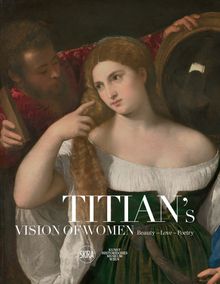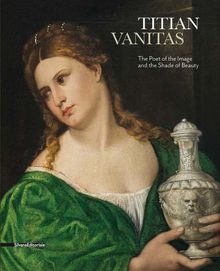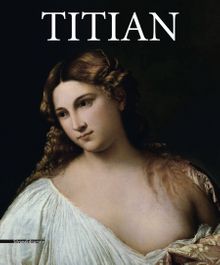ARTIST MONOGRAPHS
|
|
STATUS: Forthcoming | 8/19/2025 This title is not yet published in the U.S. To pre-order or receive notice when the book is available, please email orders @ artbook.com |
 Titian's Vision of Women
Titian's Vision of Women
Beauty – Love – Poetry
Published by Skira.
Edited by Sylvia Ferino-Pagden.
A new ideal of feminine beauty arose in 16th-century Venice, as women acquired new rights of inheritance and more social power. As a result, through the writings of poets and humanists, the construction of the desired, beloved woman began to acquire civic significance. The crucial impetus for the visual realization of this ideal came from Venice’s greatest artist: Titian. For him, artistic beauty was identical with female beauty. He was less interested in the canon of exterior beauty than in a woman’s character, in femininity as such. Titian elevates every depiction of a woman into a celebration of womanhood.
This book illustrates the Venetian representation of women in the 16th century, using comparisons between Titian and other painters of his time, such as Sebastiano del Piombo, Lotto, Palma il Vecchio, Paris Bordone, Veronese and Tintoretto. It surveys the various aspects of Late Renaissance female idealization: from realistic portraits to increasingly poetic variations, where female representation reaches its zenith as history, myth and allegory.
This richly illustrated volume also looks at the clothes and coiffures sported by sitters in both real and ideal portraits, and discusses contemporary fashion with its predilection for sumptuous fabrics and costly jewels and pearls.
Titian (1488/90–1576), born Tiziano Vecellio, is considered one of the greatest painters of the Italian Renaissance in Venice, alongside Tintoretto and Veronese. He was born in the Republic of Venice, where he apprenticed for Giovani Bellini, and where he lived until his death.
PUBLISHER
Skira
BOOK FORMAT
Hardcover, 9.5 x 11 in. / 368 pgs / 215 color / 20 bw.
PUBLISHING STATUS
Pub Date 8/2/2022
Active
DISTRIBUTION
D.A.P. Exclusive
Catalog: SPRING 2022 p. 65
PRODUCT DETAILS
ISBN 9788857243924 TRADE
List Price: $45.00 CAD $61.00
AVAILABILITY
In stock
in stock $45.00 Free Shipping UPS GROUND IN THE CONTINENTAL U.S. |
 Titian: Vanitas
Titian: Vanitas
The Poet of the Image and the Shade of Beauty
Published by Silvana Editoriale.
Edited with text by Lionello Puppi, Serena Baccaglini. Text by Giorgio Reolon, Barbara Putova, Silvia Miscellaneo, Antonio Genova.
PUBLISHER
Silvana Editoriale
BOOK FORMAT
Paperback, 9 x 11 in. / 192 pgs / 80 color.
PUBLISHING STATUS
Pub Date 2/28/2017
Active
DISTRIBUTION
D.A.P. Exclusive
Catalog: SPRING 2017 p. 100
PRODUCT DETAILS
ISBN 9788836633180 TRADE
List Price: $55.00 CAD $72.50
AVAILABILITY
In stock
in stock $55.00 Free Shipping UPS GROUND IN THE CONTINENTAL U.S. |
 Titian
Titian
Published by Silvana Editoriale.
Edited by Giovanni C.F. Villa.
Titian (born Pieve di Cadore, circa 1485–1576) began his career as an apprentice to Giorgione, and soon became the most important of the Venetian painting school. He died in his late 80s, a victim of the Venice plague--the only victim to be given a church burial.
PUBLISHER
BOOK FORMAT
Clth, 9 x 11 in. / 264 pgs / 150 color.
PUBLISHING STATUS
Pub Date 10/31/2013
Out of print
DISTRIBUTION
D.A.P. Exclusive
Catalog: FALL 2013 p. 79
PRODUCT DETAILS
ISBN 9788836625864 TRADE
List Price: $60.00 CAD $70.00
AVAILABILITY
Not available
STATUS: Out of print | 00/00/00 For assistance locating a copy, please see our list of recommended out of print specialists |
PUBLISHER
Marsilio Editori
BOOK FORMAT
Hardcover, 9.75 x 11.75 in. / 336 pgs. / Illustrated throughout
PUBLISHING STATUS
Pub Date 4/29/2008
Out of print
DISTRIBUTION
D.A.P. Exclusive
Catalog: Publisher Backlist
PRODUCT DETAILS
ISBN 9788831794121 TRADE
List Price: $65.00 CAD $75.00 GBP £57.00
AVAILABILITY
Not available
STATUS: Out of print | 00/00/00 For assistance locating a copy, please see our list of recommended out of print specialists |

